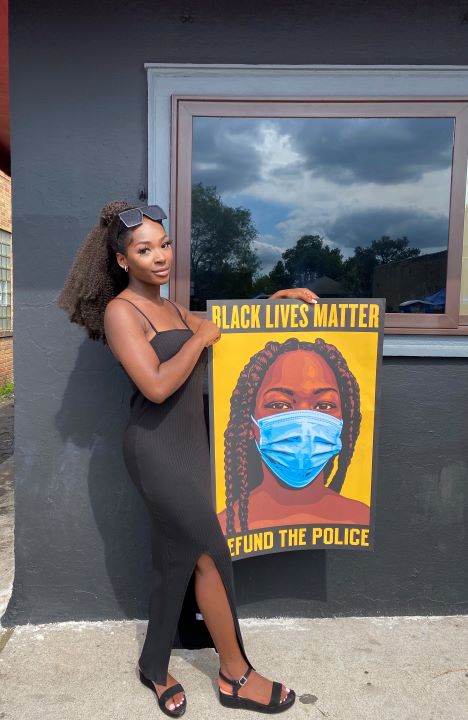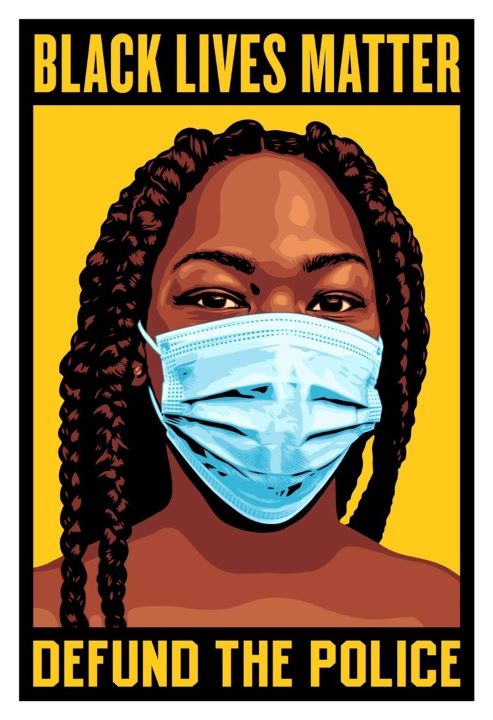This summer, Winona State University senior Akpos Eyafe became a prominent face on social media coverage of the Black Lives Matter movement across the United States.
While paying her respects at the George Floyd memorial in Minneapolis, someone asked to take her picture. Never wanting the spotlight, she cautiously agreed.
Little did she know what would happen next. She says her entire life has led up to and prepared her for the current public outcry for justice in today’s social and political climate.
Born in Andover, MN, Akpos attended WPI’s (all/white public institutions) throughout K-12. She remembers never feeling seen, but rather unseen, which for her means unheard, not considered, not looked at for anything of substantial contribution.
Around third grade, she stopped answering teachers’ questions and stopped fully engaging in peer conversation. She felt she did not belong, did not have a place at the table, and did not have an ally that fully understood her experiences as the only black girl in school.

Looking back at high school, she can now identify micro-aggressions, words that were spoken and words that were left unsaid. She also recognizes social profit made by white peers through use of black culture.
One particular instance involved a popular, white female classmate donning box braids (connected extensions) which is a traditionally and culturally black hair style. Shrieks of enthusiastic approval were heard for days, all focus and attention on the exact same kinds of braids Akpos had worn since 2nd grade without any comment whatsoever. The disparity spoke volumes and left an indelible mark.
Akpos also witnessed her father’s struggle to find work after a lay-off at his company where he served as an engineer. With successful career experience, a master’s degree from St. Thomas University, and an undergrad from his home country of Nigeria, her father, a world-traveler and U.S. immigrant with a thick accent, was repeatedly told “no”.
They were looking for someone who grew up locally, who possessed “strong communication skills”. Someone with an undergrad degree from America, someone not “overqualified”. Someone like themselves.
While she did not understand the systematic racism taking place at the time, her father sat her down two years ago to explain it in detail. She felt overwhelmed by what he had gone through and protective of him, of everyone of color in similar situations.
In college, Akpos says “I have grown into my blackness” and has found black friends/peers and a black adult support system that builds upon her family support system. She still stays mostly quiet in class, though, as she can feel the uncertainty of her white classmates as it relates to conversation, group work, or classroom discussion.
She served as an RA for two years, as well, which she says was an excellent, positive experience, but she knew going in that many of her white residents would not have diverse backgrounds and would need some time and encouragement before they would feel comfortable opening up to her about their needs.
Her instincts were 100% accurate. And she understood why, although it was stressful at times.

This summer, the day after George Floyd was murdered by police 30 minutes from her hometown, Akpos knew she needed to be on the site in solidarity with others who had also been adversely affected due to the color of their skin. She said there was a calm presence there, almost like sacred ground, eerie and deeply sad at the same time.
It was there that a black photographer (who ironically admired her braids) asked permission to take her picture for the BLM movement. Akpos said yes and posed with a wide smile under her mask.
Within 48 hours, she started seeing her picture attached to media posts about GF and BLM. A few days after that, Akpos was contacted by an artist in L.A. asking permission to use her picture for a country-wide campaign for BLM.
Again, she agreed, feeling more and more called to something greater than her own experiences, a collective movement towards racial justice. Now, she is being “seen” across the national social justice movement.
Since that time, Akpos has been attending multiple rallies and marches throughout the Twin Cities and engaging in critical conversations on her social media accounts, getting the messages of BLM out there and talked about by a widely diverse group of participants.
She says she has only gotten a few negative messages but mostly encouraging responses of gratitude for speaking her own story, which has encouraged others to do the same.
Majoring in Criminal Justice and minoring in cultural studies at WSU, Akpos envisions being a victim advocate within the prison system. She knows she will pull from every life experience, perhaps especially those resulting in recent months as social change coming from another tragic and senseless death.
She looks forward to the day when all people can fully understand what it is like to be overlooked, unseen, unconsidered, and make the personal, professional, and political shifts necessary to create an equal lens and opportunity for ALL people.
She is grateful to be on the forefront in this generation of social change agents.
I think change comes from individual movements which turn into collective movements.
If we can get the right leaders in office and have the right people hearing our cry for change then things can begin to turn around.

